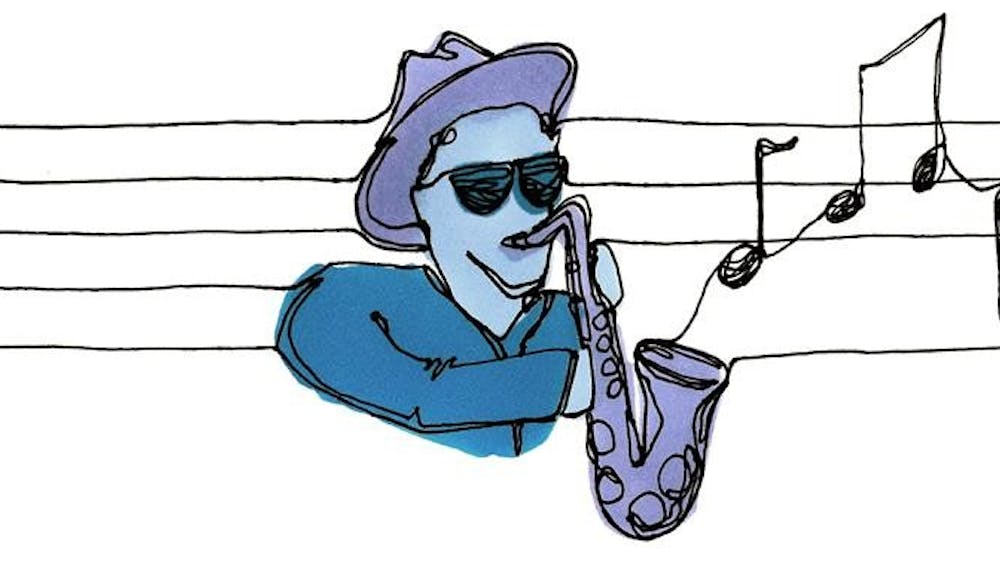Ask any college student how much sleep they get and you will probably receive the same answer: not enough.
It’s one of those things that’s supposed to happen at night but always seems to be pushed back — kind of like tomorrow’s class readings.
There are many substitutes for this elusive five-letter word. From Starbucks to Five Hour Energy Shots, college students often fake it to trick their bodies into believing
they’re getting the restorative benefits of sleep.
Sometimes, there is no better feeling than when your head hits the pillow or even the armrest of a leather couch in the Indiana Memorial Union.
When our bodies are asleep, our brains are wide awake. What happens when sleep is interrupted? And why do college students seem to be able to run on empty for
so long?
WHY DO WE NEED SLEEP?
Hitting the sack is more than an excuse to stop studying. IU Professor of Psychological and Brain Studies Preston Garraghty says it is essential to restore and recharge the brain after each day.
“When you look at what happens to your brain over the course of the day, in the morning your brain has gone back to start,” he says . “Over the course of the day, as
you experience stuff, there are transient changes in the connectional strength between neurons that reflect your experiences.”
In other words, the brain is like a hard disc, Garraghty says. As day-to-
day experiences are absorbed, the hard disc begins to fill. By nighttime, the hard disc is full, and sleep resets it again. In the morning, the hard disc is empty so it can store new memories the next day.
“Sleep must be pretty important or we would have done away with it, because if an organism could get by without sleep, it would have a comparative advantage,” Garraghty says. “Apparently, no such advantage exists.”
WHEN SLEEP GOES WRONG
For the third night in a row , IU-Purdue University freshman Megan Kirby stares unblinkingly at the dark ceiling of her bedroom.
She can’t sleep.
Kirby sits up in bed, tossing the covers in frustration, and dresses in running shorts and a T-shirt. She grabs her keys and walks out the door. She’ll run as far as she can, pushing her sleep-deprived body to the brink of collapse and then fall back into bed.
Hopefully, she’ll be able to sleep.
Kirby suffers from bipolar disorder and depression. Often, her anxiety and stress keep her up all night.
“I got sick of just lying there, so I just began finding things to do,” she
says. “I go running. I create art. I talk to people who are awake.”
Sometimes, after an all-nighter, Kirby says she feels happy — even refreshed. But that feeling doesn’t last long.
“If I can’t sleep for a while, I just don’t function,” she says. “After three full nights without sleeping, my brain starts to go in weird directions, and I end up having a panic attack or nervous breakdown.”
In her sleep-deprived state, everything becomes a challenge.
“When I don’t sleep well and still have to go to class and go to work, it’s just really hard for me to concentrate because I’m really tired,” she says. “Eventually, I’ll just collapse and not talk to anyone for a day or two, which isn’t very fun.”
Kirby doesn’t take prescribed medication for sleep-related issues because of potential side effects, but she says she’s seen an improvement in her sleeping patterns since she began seeing a therapist.
She doesn’t have so many thoughts bouncing in her head. She’s not as frequently upset or stressed as she used to be, she says.
“I’m happier now from day today,” she says. “It makes everything easier.”
IU sophomore Elias Orfan has had his own struggles with sleep.
Last year, he was diagnosed with sleep apnea.
“It’s a sleeping disorder that happens when the soft palate collapses and blocks your airway temporarily,” he says. “People can pass away when their airway is cut off for too long.”
For Orfan, it meant waking up at least five to six times a night and living in a constant state of fatigue, dry mouth, and irritation. He says he had trouble staying awake in class, hiding behind computer monitors to catch a few winks of sleep. He couldn’t concentrate on his homework and would study for a test for eight hours only to find he had scored an average grade.
When Orfan described the problem to his doctor, he was asked to participate in a sleep study. After considering the offer, he decided not to go through with it.
“Why would I bother to do this sleep study when I know what the problem is?” he says.
The problem — Orfan was 315 pounds at the time.
He says the excess weight around his neck would force down on his soft palate, which is located at the back of the roof of his mouth.
“The solution was simple,” he says, “I had to lose weight.”
Orfan took last semester off to attend a weight loss camp at La Costa Resort and Spa in Carlsbad, Calif. He was there for five months and lost more than 80 pounds.
“I didn’t look anything like the picture in my student ID, so I had to get a new one,” he says.
Since then, he hasn’t experienced any problems with sleep.
“It’s great,” he says. “I’m more rested, more focused and less lethargic. In fact, I just took a three hour nap earlier today.”
Sleeping disorders
Students with sleeping disorders recall struggles, make efforts to achieve better rests
Get stories like this in your inbox
Subscribe




